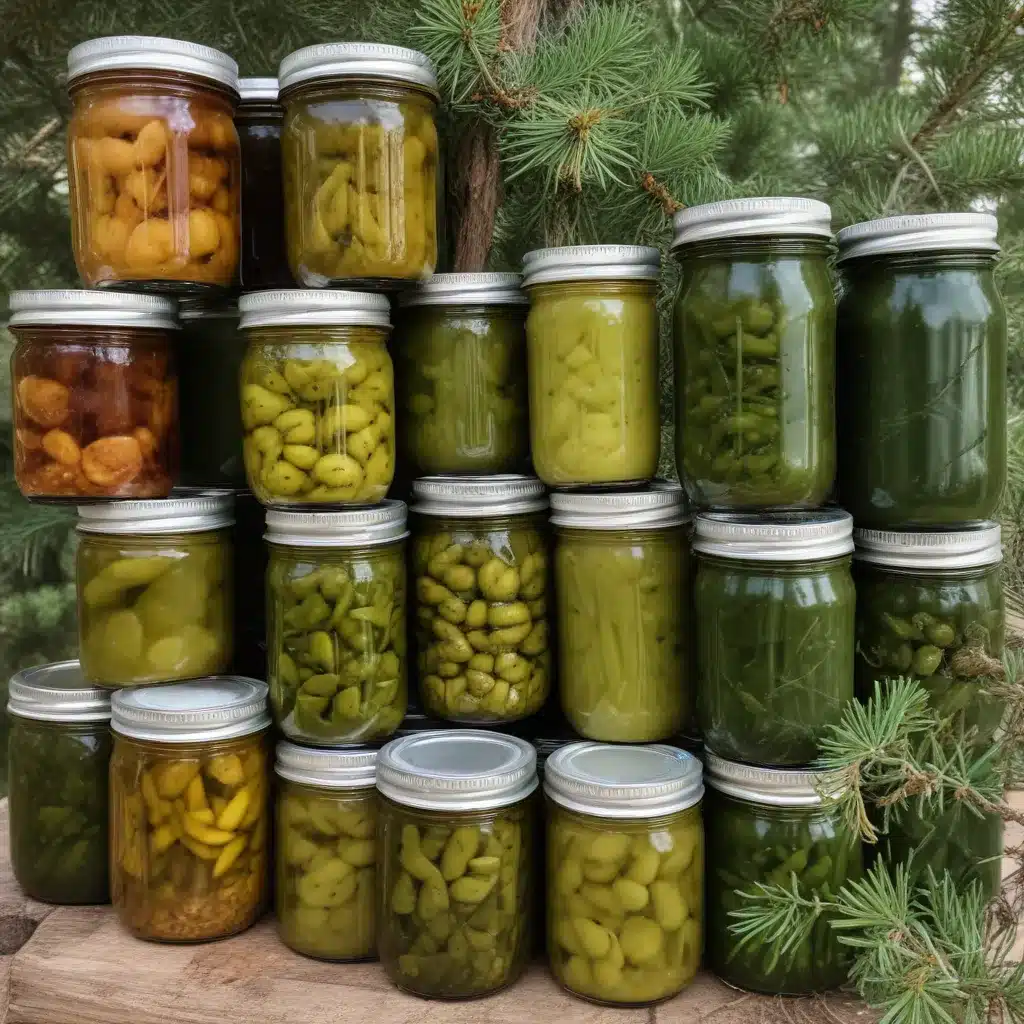
As the golden days of summer draw to a close, the orchards and gardens at Crooked Pines Farm burst with the vibrant hues and earthy aromas of a bountiful autumn harvest. This is the time of year when our community comes together to celebrate the abundance of our region, preserving the fresh flavors that will nourish us throughout the colder months.
Autumnal Harvests
The changing of the seasons is marked by the ripening of orchard fruits, the final vegetables being pulled from theraised beds, and the last of the wildcrafter’s forage being gathered. At Crooked Pines, we eagerly await the arrival of juicy peaches, crisp apples, and plump pears, which we transform into jams, butters, and preserves. Our vegetable gardens yield an impressive array of tomatoes, peppers, beans, squash, and greens, each with their own unique flavors and uses.
Beyond the cultivated crops, the surrounding forage areas provide a wealth of edible delights. Chokecherries, tart and deep purple, make a delightful syrup, while the tender young leaves of stinging nettles lend themselves beautifully to pesto and sautés. Of course, no autumn harvest is complete without the iconic prickly pear, its vibrant magenta fruits adding a splash of color to jellies and sorbets.
Canning Techniques
As the bounty piles high, the real work begins – preserving the flavors of the season for the months ahead. Canning is a time-honored tradition at Crooked Pines, one that brings our community together in a flurry of activity. Whether it’s the bubbling of tomato sauce on the stove or the rhythmic thud of lids sealing shut, the sights and sounds of canning season are deeply woven into the fabric of our farm life.
We take great care in our canning process, ensuring each jar is properly sterilized and sealed to maximize freshness and food safety. For acidic fruits and vegetables, we rely on the water bath canning method, submerging jars in a large pot of boiling water to create an airtight seal. Low-acid items, such as meats and some vegetables, require the more intensive pressure canning technique to eliminate the risk of botulism.
Food Storage Solutions
In addition to canning, we employ a variety of other preservation methods to make the most of our harvest. Fermentation is a favorite, as it not only extends the lifespan of produce but also enhances the nutritional profile. Sauerkraut, kimchi, and pickled vegetables line our pantry shelves, ready to lend their tangy flavors to a host of dishes.
For some crops, drying and dehydrating are the best options. Herbs, like rosemary and thyme, are carefully dried and stored for use in winter stews and roasts. Sliced apples, pears, and even tomatoes are dehydrated, becoming delightful snacks or garnishes for soups and salads.
And of course, no Crooked Pines autumn is complete without the annual root cellar harvest. Potatoes, onions, and winter squash are carefully packed away in our underground storage, where the cool, dark conditions will keep them fresh for months to come.
Crooked Pines Local Bounty
When it comes to preserving the harvest, the team at Crooked Pines takes great pride in showcasing the incredible diversity of our region’s produce. From the sweet-tart notes of our heirloom apple preserves to the earthy, umami-rich flavors of fermented shiitake mushrooms, each item in our pantry tells a story of our local land and the hands that cultivated it.
Our orchard fruits, with their vibrant hues and nuanced flavors, lend themselves beautifully to an array of preserves. Spiced pear butter, tangy plum chutney, and zesty citrus marmalade are just a few of the staples we stock up on each year. And of course, we can never have too much tomato sauce – a versatile foundation for countless winter meals.
The vegetable garden at Crooked Pines is a veritable cornucopia, providing us with an abundance of fresh produce to preserve. Crisp dill pickles, savory roasted red pepper spread, and earthy beet kvass are just a few of the ways we capture the essence of our homegrown veggies.
Beyond the cultivated crops, our foragers scour the surrounding areas for wild edibles to incorporate into our preserves. Tart chokecherry syrup, vibrant prickly pear jelly, and fragrant rose petal jam add unique local flavors to our pantry shelves.
Culinary Traditions and Culture
Preserving the harvest at Crooked Pines is not just about stocking our own shelves – it’s about honoring the culinary traditions and cultural heritage of our diverse community. Each jar, each ferment, each dried bundle represents the culmination of generations’ worth of knowledge, passed down through the years.
When we gather as a community to can tomatoes or pickle cucumbers, we’re not just putting food by for the winter – we’re forging connections, sharing stories, and celebrating the rich tapestry of our local foodways. Whether it’s an heirloom canning recipe from a longtime resident or a traditional fermentation technique from a recent immigrant, every preserve we create is imbued with the spirit of Crooked Pines.
Our commitment to sustainable practices also shines through in our preserving efforts. By embracing low-waste methods like lacto-fermentation and drying, we minimize our environmental impact while maximizing the nutritional value and shelf life of our produce. And by highlighting the abundance of our local ecosystem, we encourage others to explore the bounty that surrounds us, fostering a deeper appreciation for the rhythms of nature.
As the final days of autumn draw to a close and we begin to hunker down for the winter months, the pantries and cellars of Crooked Pines Farm will be bursting with the vibrant colors and flavors of our seasonal harvest. Each jar, each bundle, each preserved delight will nourish us not just physically, but also emotionally and spiritually – a testament to the hard work, creativity, and community that lies at the heart of our farm.


